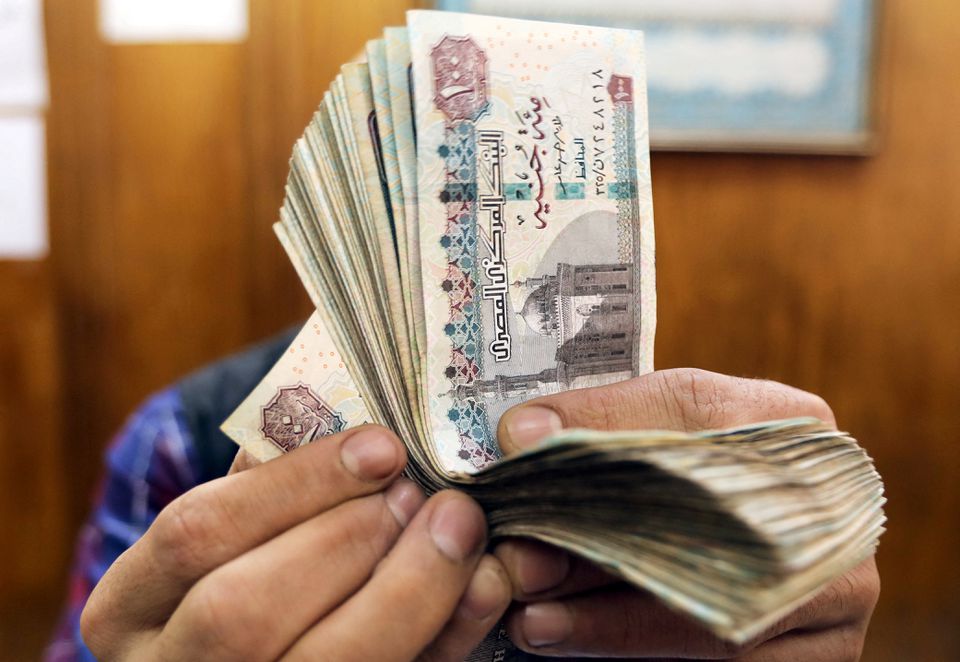Egyptians woke up on Thursday to more news anxiety, with the local currency sliding to a record new low, falling by more than 14 percent against the U.S. dollar.
The news comes after the Central Bank of Egypt’s acting governor, Hassan Abdalla, said during Egypt’s Economic Conference on Sunday that Egypt will develop a new currency indicator based on a basket of several currencies as well as, possibly, gold.
The acting director added that Egypt is aiming to change the culture that the Egyptian pound should be solely pegged to the U.S. dollar to reduce the effects of major currency fluctuations on investment performance.
Though he did not provide any additional details, analysts have pointed out that the move reflects a shift in the direction of the economy, as Egypt’s current biggest trade partners are China and Saudi Arabia, not the United States.
In the same vein, Prime Minister Mostafa Madbouly spoke at the same conference to overturn claims that the value of the currency against the US dollar indicates the strength of the economy. He noted that a weaker currency is sometimes necessary to strengthen the economy through increasing exports and investments.
But to what extent can a devaluation be beneficial? Egyptian Streets provides a brief explanation of what the current devaluation means for the economy and society as a whole.
What has happened so far?
Since the Ukraine-Russia conflict, Egypt has faced financial constraints that have weighed on its currency due to higher commodity prices and a sudden drop in portfolio investments. In early March, it was estimated that portfolio outflows from Egypt were at USD 3.0 billion (EGP 69 billion), signaling a massive reduction in foreign reserves.
In response, the Monetary Policy Committee (MPC) decided to raise the CBE’s overnight deposit rate, overnight lending rate, and the rate of the main operation by 200 basis points to 11.25 percent, 12.25 percent, and 11.75 percent, respectively.
As a result, the Egyptian pound dropped to a near all-time low since the 2016 devaluation, trading at EGP 19.27 to the dollar.
Investors have previously expressed that the Egyptian pound needs to devalue further, as analysts at investment bank JPMorgan noted in March that the Egyptian pound was currently more than 15 percent overvalued.
Investment bank Goldman Sachs Group Inc. also estimated that Egypt may need to secure a USD 15 billion (EGP 286 billion) package from the IMF to meet its funding requirements over the next three years.
However, Egypt’s Minister of Finance, Mohamed Maat, affirmed on Sunday during the conference that “analysis of financial performance indicators over the past 42 years confirm progress,” and that “debt and deficit rates of GDP are under control despite successive global crises.”
“We are keen to diversify sources of financing, reduce the cost of development, integrate the informal economy and increase tax revenues by 5 percent of GDP annually over the next four years,” the minister added.
Egypt’s partnership with its Gulf allies has helped alleviate its funding crisis in light of the Ukraine conflict and the COVID-19 pandemic. In August, the Sovereign Fund of Egypt signed a draft agreement with Saudi Arabia’s Public Investment Fund to launch a new company – the Saudi Egyptian Investment Company – in Egypt to attract investments worth USD 10 billion (EGP 194 billion).
What are the disadvantages of devaluation?
Devaluation has brought severe economic turmoil for other countries, with examples such as Argentina, Turkey and Lebanon.
Adopting this policy can risk price instability in the local market and lead to unofficial dollarization in parallel markets due to the desperate need for dollars and the pessimism around the local currency. The rise in USD price in exchange for the local currency may also inflict further budget deficit as foreign debt payments become more costly.
Local and international confidence in Argentina’s economy deteriorated over the years as a result of its devaluation since 2018, as the government struggled with funding the economy and failed to control foreign exchange operations in black markets. The US dollar rose to new highs against the pesos, selling dollars for over 300 pesos instead of 130 pesos at an official currency exchange.
“The only thing customers don’t want to hold is pesos . . . many ask questions about what’ll happen next,” one Argentinian told the Financial Times.
One of the main risks of devaluation can be explained by the term ‘money illusion’, which is a bias in the assessment of the real value of transactions due to the frequent and unpredictable changes of the value of a currency or from one currency to another. When people lose their sense of value for a currency, they wrongly judge the worth of their accumulated wealth, which may have in fact decreased rather than increased.
This bias can be more detrimental in the long-term, as it affects individuals’ decisions regarding long-term financial contracts, such as purchasing and renting a home. In these situations, money illusion as a result of currency devaluation can affect an individual’s perception of the real value of a particular asset.
To avoid this scenario, economists have recommended policymakers to lessen the reliance on the US dollar and encourage the use of a basket of currencies.
What are the advantages of devaluation?
The advantages of devaluation largely depends on the strength of a country’s economy and the targets it aims to achieve.
For instance, an economy that is mainly based on tourism will attract more visitors as trips will become much cheaper. The same goes for remittances, which increase in value, implying that more money will arrive from Egyptians living in other countries with a stronger currency.
Additionally, devaluation can push people who produce and sell things abroad or earn money in a different currency to make more money, which can encourage Egyptian brands to export and earn more.
How will this affect Egyptians?
One of the clear setbacks of the devaluation of the Egyptian pound is that Egyptians earning in the local currency lose their purchasing power, and due to lack of financial education, an individual’s wealth will often be overstated.
Egypt’s Prime Minister Mostafa Madbouly announced on Wednesday an increase in the minimum wage for public employees, from EGP 2,700 to EGP 3,000, and fixing current electricity prices for households through June 2023.
Schooling costs for children studying in international schools or in other countries may also increase, which could put additional pressure on parents and household expenses, and possibly increase the popularity of school loans. Exposure to such exchange rate fluctuations may force private companies to offer compensation through loans, social benefits or a salary raise.
Recently, the International Monetary Fund (IMF) and Egypt have reached an agreement for EGP 68 billion (USD 3 billion), which aims to “safeguard macroeconomic stability and debt sustainability, improve Egypt’s resilience to external shocks.”
However, these policies will certainly determine the political legitimacy and level of trust between citizens and the government in the long-term. In the closing ceremony of Egypt’s Economic Conference, President Abdel Fattah El-Sisi admitted that the country is facing difficult circumstances, and that salaries are not enough to meet the needs of ordinary Egyptians.
“I am speaking from the heart with you all, but the salaries are not enough, and any salary below EGP 10,000 is not enough to sustain a living,” he said.







Comments (6)
[…] are currently facing economic anxiety, with the local currency sliding to a record new low, falling by more than 14 percent against the U.S. […]
[…] are currently facing economic anxiety, with the local currency sliding to a record new low, falling by more than 14 percent against the U.S. […]